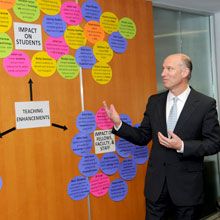
Life-long learning is a commonplace, throwaway line that seems to work its way into nearly every graduation ceremony. Every graduation that is, except for the 10th Cohort of the Master Teacher Leadership Development Program (MTLDP). There, on the top floor of the GW Hospital, a cadre of health professionals, already well on their way to successful careers in medical education, presented the results of an intensive, year-long leadership development program for faculty in medicine, health sciences, and basic sciences. For them, life-long learning isn’t an aspiration; it’s a mission.
The program, administered by GW’s Graduate School of Education and Human Development (GSEHD) for the School of Medicine and Health Sciences (SMHS), is designed to enhance teaching skills, foster scholarship in education, and develop educational leadership potential. This year, the two schools celebrated the graduation of 13 faculty members who teach medical students, residents, and fellows at GW, Children’s National Medical Center (Children’s National), and the Washington, D.C. Veterans Affairs Medical Center. Since its inception in 2002, 104 faculty members have completed the program.
Ellen Goldman, Ed.D., assistant professor of Human and Organizational Learning and director of MTLDP, noted that a unique aspect of the program is “the changes faculty make to their teaching and educational scholarship and leadership while they are completing their coursework.”
The program consists of six courses (18 credit hours) taken over the course of one year, with 5 hours per week spent in class and an additional 10-15 hours preparing assignments. Course completion is awarded a university certificate and comprise half a Master’s degree. Classes delve into the theories, tools, and methods for teaching students, residents, fellows, other faculty, patients, and families; and for leading organizational groups and teams dedicated to improving patient care delivery.
“It’s an attempt to change the culture, to say that education is valuable, to provide formal education for what you are doing — teaching,” says Yolanda Haywood, associate dean for Student and Curricular Affairs at SMHS.
“The impact on the organization over this decade has been remarkable,” says Jeffrey S. Akman, M.D. ’81, G.M.E. ’85, interim vice president for Health Affairs and dean of SMHS. “The relationships that are created and the way this brings together the learners and master teachers and the leadership of this program, as well as the underlying theme that we are working to enhance the capacity of our school as a leaning environment.”
As a graduate of Cohort 2, Haywood knows well the impact that MTLDP can have on an institution and an individual. “I am so impressed with the volume and quantities of work this year’s graduates have accomplished, but that only means we expect great things from each of them in the future. I know what great work is possible when like-minded individuals struggle together to accomplish goals.”
The courses focus on the shifting demands of teaching and leading adults, such as: understanding adult learning styles, models, and theory; enhancing the performance and learning of work groups and teams in organizations; the design of curriculum and assessment of learning; qualitative research methods and project design; and leadership and organizational change theory and leadership skill enhancement.
Mark Batshaw, executive vice president and chief academic officer at Children’s National, as well as chair of pediatrics and associate dean of academic affairs at GW, recalled the debut of the program in 2002. “I wanted to professionalize teaching. We had many faculty members who were good teachers and wanted to teach, but didn’t have the training. It makes me feel wonderful to see how this program has grown.”
“We expect a return on our investment we’ve made through this program,” Batshaw adds. “We expect the graduates to serve as leaders in their programs and departments and inculcate their colleagues with the approaches toward learning and leadership that they’ve learned here.”


